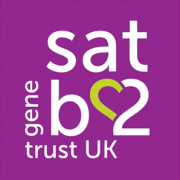About
The SATB2 Gene Trust UK was established to enhance the lives of those affected by SATB2-associated syndrome by providing emotional and educational support, and by raising awareness and supporting research.
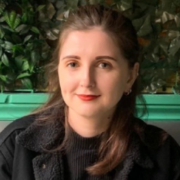
Dr. Stacey Bissell is a Postdoctoral Research Fellow at the Richards Lab and Cerebra Network for Neurodevelopmental Disorders, University of Birmingham. Her research investigates the impact of sleep disorders, epilepsy severity and autism characteristics on the presentation of behaviours associated with rare genetic syndromes and intellectual disability. At the University of Birmingham, Dr. Bissell led the Cerebra funded work that explored self-help skills, repetitive behaviours, behaviours that challenge, communication skills and health problems in 81 children and adults with SATB2-associated syndrome (to be published in 2021).
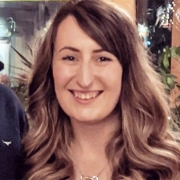
Lauren Shelley is a Research Assistant at Aston University. She currently works on a research project exploring the profile of mental health, behaviour and cognition in genetic conditions, including Bardet-Biedl syndrome. Previously, Lauren worked as a Research Assistant at the Cerebra Centre for Neurodevelopmental Disorders, University of Birmingham, where she supported projects aiming to improve clinical outcomes in children and young people with genetic syndromes and intellectual disability.
From Autumn 2020, Lauren will be conducting a PhD exploring behaviours that challenge in SATB2-associated syndrome.

Dr. Hayley Crawford is an Assistant Professor at University of Warwick Medical School. Her research focusses on characterising behavioural difficulties and mental health problems in individuals with neurodevelopmental disorders associated with intellectual disability. Her work to date has primarily focussed on understanding autism, anxiety, ADHD and behaviours that challenge in children and adults with rare genetic syndromes through describing behavioural profiles, developmental trajectories, risk markers, and mechanistic underpinnings.
As part of the Cerebra Network for Neurodevelopmental Disorders, Hayley conducts research that improves understanding of autism and anxiety in children with rare and complex needs.
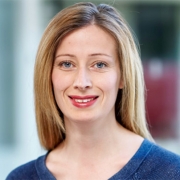
Dr. Jane Waite is a Clinical Psychologist and Lecturer at Aston University. Jane’s research focusses on understanding, assessing and treating mental health problems in individuals with neurodevelopmental conditions. As part of the Cerebra Network for Neurodevelopmental Disorders, Jane leads a programme of work to better understand mental health in children with rare genetic syndromes and is developing assessment tools and interventions to be used in clinical services.
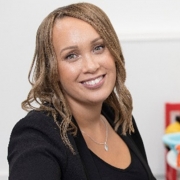
Dr. Caroline Richards, Senior Lecturer in Neurodevelopmental Disorders, is a Clinical Psychologist and researcher at the University of Birmingham. Her research focuses on reducing negative clinical outcome for children. Caroline leads a programme of sleep and behaviour research at the Cerebra Network for Neurodevelopmental Disorders. This research will help us to understanding why sleep problems occur in children with rare genetic syndromes, andhelp families to find solutions to these sleep difficulties.
Outside of work Caroline enjoys spending time with her family, especially her twin boys, who have helped her to understand the critical importance of sleep!
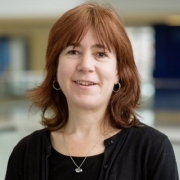 Dr. Jennifer Fish is an Assistant Professor at the University of Massachusetts Lowell (UML), where she teaches Developmental Biology and Comparative Vertebrate Embryology. Prior to arriving at UML, she trained at King’s College London and the University of California San Francisco. Dr. Fish has been researching the roles of SATB2 in development since 2008 using animal models of disease.
Dr. Jennifer Fish is an Assistant Professor at the University of Massachusetts Lowell (UML), where she teaches Developmental Biology and Comparative Vertebrate Embryology. Prior to arriving at UML, she trained at King’s College London and the University of California San Francisco. Dr. Fish has been researching the roles of SATB2 in development since 2008 using animal models of disease.
Her research involves in vivo assays (in the mouse model system) and in vitro studies on osteoblasts (bone cells) and neurons. Additionally, through involvement in the SATB2 Gene Foundation, Dr. Fish’s lab is using SAS patient-derived induced pluripotent stem cells to further investigate disease mechanisms and treatments.
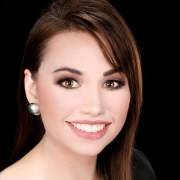 Ashlen Thomason, Ph.D., CCC-SLP, is a member of the outpatient speech pathology team at Arkansas Children’s Hospital. She is a graduate of the Arkansas Consortium for the Ph.D. in Communication Sciences and Disorders with a major research emphasis in stuttering and minor in cleft palate.
Ashlen Thomason, Ph.D., CCC-SLP, is a member of the outpatient speech pathology team at Arkansas Children’s Hospital. She is a graduate of the Arkansas Consortium for the Ph.D. in Communication Sciences and Disorders with a major research emphasis in stuttering and minor in cleft palate.
Ashlen is an adjunct instructor for the University of Arkansas for Medical Sciences Department of Audiology and Speech Pathology graduate program teaching Fluency Disorders and supervising student clinicians. She is the director of the Arkansas Stuttering Network, a non-profit organization designed to elevate the level of care available to Arkansans who stutter.
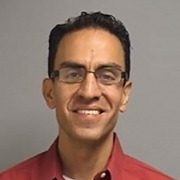 Dr Yuri Zarate is a Clinical Geneticist and an Associate Professor at the University of Arkansas for Medical Sciences and Arkansas Children’s Hospital. In 2014, Dr Zarate started a research project that led to a report with the first cohort of patients with SATB2-associated syndrome (SAS). From there, he established a strong-long lasting relationship with the support group for this rare condition, created the initial dedicated SAS website, and launched the only available clinical registry for this syndrome.
Dr Yuri Zarate is a Clinical Geneticist and an Associate Professor at the University of Arkansas for Medical Sciences and Arkansas Children’s Hospital. In 2014, Dr Zarate started a research project that led to a report with the first cohort of patients with SATB2-associated syndrome (SAS). From there, he established a strong-long lasting relationship with the support group for this rare condition, created the initial dedicated SAS website, and launched the only available clinical registry for this syndrome.
Through his leadership, Arkansas Children’s Hospital hosted multidisciplinary international SAS clinics in 2017 and 2018 and will continue to be the only dedicated clinic in the United States to offer routine care for this population. Dr Zarate has published extensively on different aspects regarding this syndrome and activity leads and collaborates on several ongoing SAS-related research projects.
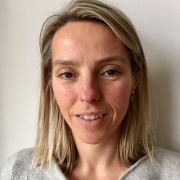 Drs. Barber Tinselboer is a physician for people with Intellectual Disabilities (ID). In the Netherlands, this is a medical specialty, created to provide better medical care to people with ID. Her work is comprised mostly of treating the comorbid conditions in people with ID like epilepsy, behavioural issues, psychiatric disorders and additional physical problems. She works at ‘s Heeren Loo in Apeldoorn, an organization that provides care, services and treatment for people with ID. She also has a son with SATB2-associated syndrome.
Drs. Barber Tinselboer is a physician for people with Intellectual Disabilities (ID). In the Netherlands, this is a medical specialty, created to provide better medical care to people with ID. Her work is comprised mostly of treating the comorbid conditions in people with ID like epilepsy, behavioural issues, psychiatric disorders and additional physical problems. She works at ‘s Heeren Loo in Apeldoorn, an organization that provides care, services and treatment for people with ID. She also has a son with SATB2-associated syndrome.
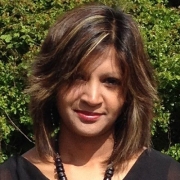 Dr Meena Balasubramanian completed her Paediatric training before undertaking specialist training in Clinical Genetics. Her MD is on atypical presentation of Osteogenesis Imperfecta (OI) obtained in 2012. She has been a Consultant in Clinical Genetics with a specialist bone genetics interest at Sheffield Children’s Hospital since 2012, and provides genetics input to the national OI service. She has led several projects focused on genetics of rare bone disorders and currently pursuing research projects focussed on identifying novel genomic approaches to rare bone disorders and exploring newer targets for therapy for these conditions.
Dr Meena Balasubramanian completed her Paediatric training before undertaking specialist training in Clinical Genetics. Her MD is on atypical presentation of Osteogenesis Imperfecta (OI) obtained in 2012. She has been a Consultant in Clinical Genetics with a specialist bone genetics interest at Sheffield Children’s Hospital since 2012, and provides genetics input to the national OI service. She has led several projects focused on genetics of rare bone disorders and currently pursuing research projects focussed on identifying novel genomic approaches to rare bone disorders and exploring newer targets for therapy for these conditions.
Dr Balasubramanian has a long-standing interest in SATB2/ 2q33 microdeletion syndrome having published the largest series of patients with 2q33 deletion at the time (Balasubramanian et al., J Med Genet 2011) and UNIQUE leaflet on this. She has since established a national multi-disciplinary SATB2 clinic in the UK and a regular attendee at the UK-SATB2 support group annual meeting since its inception.
Her other roles include Bone fragility lead for Genomic Clinical Interpretation Partnership (GeCIP), part of 100,000 Genomes project initiative to establish genetic causes of rare diseases in UK. She is the Diagnostic Working Group Co-lead for BOND-ERN (Rare Bone Disease- European Reference Network). She works as Council member for Clinical Genetics Society and serves on the ‘Medical Advisory Board’ for Brittle Bone Society, recently doing a podcast on genetics to coincide with Rare Disease Day in Feb 2019.
Her research interests include: SATB2 and bone health, digital disease phenotyping; basic science research with industry in identifying new targets for treating bone fragility. She has close links nationally and internationally with scientists and clinicians in other metabolic and genetic centres.
Dr Balasubramanian’s other areas of specialism, include Genetics in autism & Paediatric Dysmorphology. She has published over 67 first and senior-author publications in these areas; patient information leaflets for rare genetic disorders and text books including a recent molecular medicine series on OI.
